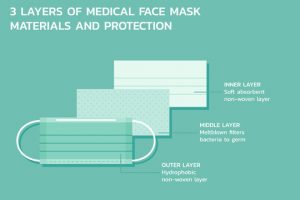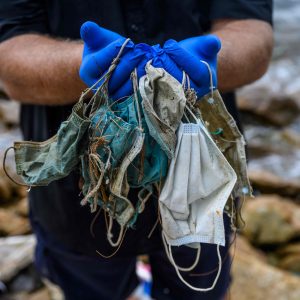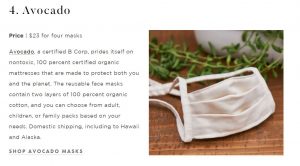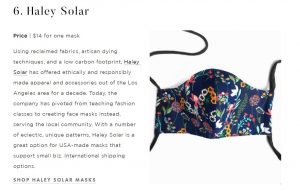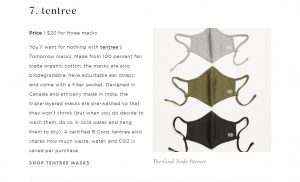Background: The CDC states that COVID-19 spreads mainly from person to person through respiratory droplets (e.g. cough, sneeze, talk). Masks provide a simple barrier to these droplets. Despite the initial aversions/debate to wearing a mask, many states have now implemented mask mandates that require a face covering when leaving one’s residence. Masks are most effective when everyone wears one.
From an article by Mayuri Wijayasundara, she states how face masks may consist of one or more layers, each with different functions:
- an outermost layer, designed to repel liquids such as water
- the innermost layer, which absorbs moisture and allows comfort and breathability
- a non-absorbent middle layer, to filter particles
Trends: Imagine one disposable mask a day per every person in your house. Now think of your place of work or school. Can you imagine the number of masks needed for your state? How about all the masks needed in the country? Finally, the world. That’s just one day of masks. But they all are thrown away and the cycle repeats. All of these masks are discarded from each person’s hands, but they still exist. Whether that be sitting in a landfill or swimming with the fishes or peeking out of the sand like a clue to a treasure.
Increased demand of personal protective equipment (PPE) has been a driver of increases plastic pollution. “According to a study published in Environmental Science and Technology journal, an estimated 194 billion disposable masks and gloves are being used globally every month as a result of the coronavirus pandemic” (Disposable Face Masks are Damaging the Environment 2020).
Additionally, masks have become a fashion statement and diversified to become another necessary piece of apparel. Masks are a way for companies to market and promote their support for masks. The rising trend has also increased sales for homemade masks. I have seen masks that cost 3$ all the way to $50. While masks are becoming normalized, another sector shifting is individual consumption to more take-out and online ordering. “The global plastic packaging market size is projected to grow from USD 909.2 billion in 2019 to 1012.6 billion by 2021 due to pandemic response” (Adyel 2020). What does this projection mean for the environment?
Environmental Impact: Most of the masks in the U.S. are made out of polypropylene-based plastic-or related forms of plastic such as polystyrene, polycarbonate, or polyethylene. “These synthetic fibers are designed to resist liquids and do not biodegrade in the environment once discarded” (From the Editors of E). They instead break down into microplastics or extremely small pieces of plastic. This can also be applied to reusable masks. Despite the longer life span, most reusable masks are made from synthetic fibers like nylon or polyester which also do not biodegrade. “Disposable plastic masks that end up in the oceans could take up to 450 years to decompose (Written by Reuters Staff 2020).
Potential solutions: The Royal Society for the Prevention of Cruelty to Animals (RSPCA) encourages people to “snip the straps” after use of a disposable mask to prevent animals getting tangled up in them (Parkinson 2020). It is important to note your purchase has an impact. It can be overwhelming the amount of choices when searching for a mask. It is understandable how buying a box of 50 disposable masks can be the simplest and least stressful. There are biodegradable masks that are made from cotton, bamboo, or hemp that can work as alternatives to single-use plastic ones for those not in the healthcare industry. Images below taken from The Good Trade website are three different companies that source responsibly. Some companies also donate masks with each purchase. If this latter option is viable, I urge the investment in a sustainably made mask. While they might be more costly, in the long term, they will do more help than harm.
Conclusion: This is an example of how one action can have a huge effect when you add everything up. COVID-19 has changed everyone’s life. As we adapt to this, it is essential we make choices for those who cannot. Nature and wildlife play a huge role in Earth’s services and on an individual level, what type of mask you get and how you dispose of your mask can make a positive (or negative) difference. This article is not saying risk your health and others. However, hopefully it has brought awareness to alternatives for those not in healthcare and able to afford a more sustainable option.
Works Cited
Adyel, Tanveer M. “Accumulation of Plastic Waste during COVID-19.” Science, American Association for the Advancement of Science, 11 Sept. 2020, science.sciencemag.org/content/369/6509/1314.
Covid-19: Considerations for Wearing Masks. www.cdc.gov/coronavirus/2019-ncov/prevent-getting-sick/cloth-face-cover-guidance.html.
Disposable Face Masks Are Damaging the Environment. It’s Time to Kiss Them Goodbye, Once and for All. 13 Nov. 2020, www.independent.co.uk/life-style/face-masks-coronavirus-environment-climate-change-b1721922.html.
From the Editors of E – The Environmental Magazine. “EarthTalk: What’s the Environmental Impact of Single-Use Masks, Gloves Now in Use Because of COVID-19?” Mail, 25 Oct. 2020, www.wvgazettemail.com/earthtalk-whats-the-environmental-impact-of-single-use-masks-gloves-now-in-use-because-of/article_2634bcfc-6567-5995-a65b-c73ee11eeffe.html.
“15 Sustainable Brands Making Face Masks For Social Distancing.” The Good Trade, The Good Trade, 13 Jan. 2021, www.thegoodtrade.com/features/reusable-face-masks.
Parkinson, Justin. “Coronavirus: Disposable Masks ‘Causing Enormous Plastic Waste’.” BBC
News, BBC, 13 Sept. 2020, www.bbc.com/news/uk-politics-54057799.
Wijayasundara, Mayuri. “Millions of Face Masks Are Being Thrown Away during COVID-19. Here’s How to Choose the Best One for the Planet.” The Conversation, 14 Jan. 2021, theconversation.com/millions-of-face-masks-are-being-thrown-away-during-covid-19-heres-how-to-choose-the-best-one-for-the-planet-147787.
Written by Reuters Staff. “This French Firm Is Making Biodegradable Face Masks Using Hemp.” World Economic Forum, 18 Sep 2020. www.weforum.org/agenda/2020/09/hemp-france-face-masks-coronavirus-covid-pandemic/.
